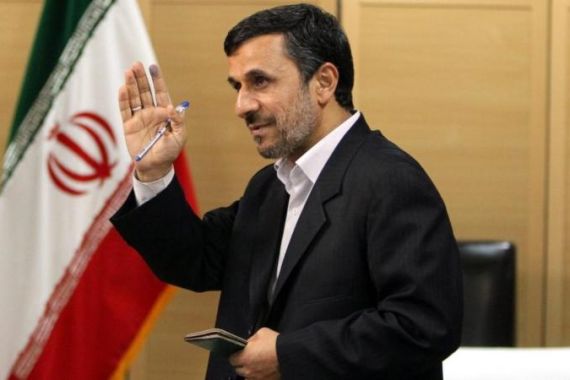Iran holds second round of parliamentary vote
Up to 130 candidates vying for 65 seats in the 290-seat Majlis currently dominated by conservative factions.

Iranians have voted in a second round of parliamentary elections seen by the country’s leaders as an endorsement of their controversial nuclear development programme, state media reported.
Major polling stations in Friday’s polls were packed with people voting for 25 of Tehran’s 30 seats in the parliament, state television reported. The other five were decided in the first round in March.
President Mahmoud Ahmadinejad and his wife, Aazam Farahi, cast their ballots in the afternoon without making any remarks to waiting reporters.
Ali Larijani, the parliament speaker, told state television that a high voter turnout would soften attitudes by Western nations, which have imposed crippling sanctions suspecting Iran is on course to acquiring an atomic bomb.
Iran insists its programme is intended for generating power.
Double-digit inflation
“When the West and some regional countries find out that Iranian government has the strong support of its people, global enemies will be pushed back and peace will return to the region,” Larijani said.
Some voters said they were voting over economic issues.
Several rounds of UN sanctions over the nuclear issue have hit Iran hard, contributing to double-digit inflation and unemployment.
Of the 130 candidates, two for each of the 65 seats, 69 are conservative opponents of Ahmadinejad, about 26 back the president and the rest are centrists.
Although Ahmadinejad is likely to serve until the end of his term in August 2013, his allies have been forced out of key posts and his political clout has been weakened.
Nuclear stalemate
Western nations, led by the US and the EU, have demanded Iran stop uranium enrichment – a pre-requisite for building a nuclear bomb – but Iran has so far shown no sign of backing down.
“My advice is that people take the run-off as seriously as the first round,” Ayatollah Khamenei, the supreme leader, said in comments carried live by state television after he cast his vote.
Conservative opponents of Ahmadinejad already won an outright majority of seats of the new parliament in the first round of elections.
Ahmadinejad, who won re-election in 2009 in a hotly disputed election with the backing of the clerical establishment, has seen his political fortunes decline sharply after he was perceived to have defied the supreme leader in April 2011 and tried to expand the authority of the presidency.
The new parliament, which has no direct control over major policy matters like Iran’s nuclear programme, will begin its session in late May.
But it can influence the selection of Ahmadinejad’s successor and other senior officials and give backing to the policies of Khamenei.